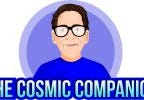The Science and History of The Wizard and The Scholar
Looking at the science and history behind The Wizard and The Scholar (or, a Rapscallion Runs Amok in Rye), a New Tale of Robin Hood
This week on The Cosmic Companion, we’re diving into the science and history behind our first feature-length film, The Wizard and The Scholar (or A Rapscallion Runs Amok in Rye).
Set in the year 1156, this film blends fantasy, adventure, and historical drama, along with real-life science and history, told through the magic of storytelling.
Heads up: spoilers ahead. If you’re feeling adventurous, stay tuned. For the spoiler-averse, maybe consider a cozy retreat in your sensory deprivation tank?
also available at: https://youtu.be/oKKPSMGLUno
The idea for this film sparked when I took an online magic class. Now, I’m no magician, but I learned a few tricks and began to wonder: what if wizards in the Middle Ages were actually just clever stage magicians? And what if these “wizards,” fully aware of their lack of supernatural powers, had to face a dark and mysterious threat?
This concept is set against the rich backdrop of the mid-12th century, a fascinating era in English history made even more special with the legendary tales of Robin Hood.
Act I: The Role of the Wizard
In Arthurian legends, the enigmatic Morgan Le Fay, half-sister to King Arthur, is a master manipulator of Camelot’s fate. In our film, Morgan subtly influences our heroes’ destinies centuries after her time.
In an age when belief in magic was widespread, those claiming magical powers often held significant sway, potentially as trusted advisors to leaders. Elara, a young, newly-appointed wizard in our film, is a memory keeper — possessing what we would today call a photographic memory.
Act II: Science in the 12th Century
During Europe’s near 1,000-year intellectual stagnation, scientific knowledge from Ancient Greece and the Library of Alexandria was preserved and expanded upon in the Middle East. By the 11th and 12th centuries, science thrived in China, with some of this knowledge reaching Europe via the Silk Road.
The Wizard and The Scholar, set in 1156, showcases Europe’s scientific reawakening after a long slumber. One of our main characters, Adelaide, hails from Granada (now Spain). Her travels around the Mediterranean and to Constantinople, a Silk Road endpoint, arm her with the scientific knowledge crucial for her and Elara to navigate enormous challenges and survive grave threats.
We’ve strived for historical and scientific accuracy. For instance, we depict a window’s edges sparkling in gold, based on a powder mixture developed by Chinese scientists, akin to modern sparklers. Such a spectacle, learned by Adelaide on her travels, would have been remarkable in 12th-century England.
Remarkable.
A fictionalized lunar eclipse plays a pivotal role in our plot, adding a touch of celestial wonder to our narrative.
The Wizard and The Scholar combines magical storytelling with historical and scientific authenticity, offering a unique glimpse into one of the most intriguing periods in English history. Join us on this enchanting journey through the past, where magic and science intertwine in a tale of adventure and discovery.
[INTERMISSION. 12th CENTURY BOOGIE PLAYS.]
Act III: Historical Context
12th century England was a land of stark contrasts, rich in history and cultural transformations. Nobles lived comfortably in castles and manors, while most peasants faced tedious labor.
The Anarchy (which lasted 18 years, between 1135 and 1153), a civil war between King Stephen and Empress Matilda, afflicted England with sieges and famines until three years before the opening of our film. These real-world events helped shape Lord Roberts’ development as the main antagonist, while also enriching the story with genuine historical conflict.
Act IV: Mythology and Folklore
In 12th century England, myths, legends, and folklore were integral to everyday life. Religion intertwined with folklore, with people often swayed by tales of saints, miracles, and the supernatural.
Our movie explores the intricate web of mythology, featuring the iconic figure of Robin Hood. While this timeless character is likely forged from stories of several people, the legendary Robin Hood stands as a symbol of defiance against oppression and as a champion of justice.
Incorporating Robin Hood into our narrative, we connect history with myth, offering a character who may be legendary but personifies the ethos of an era.
Act V: Denouement/Conclusion
The Wizard and The Scholar is a unique fusion of science, history, and storytelling, set against the backdrop of 12th century England. We explore the complexities of medieval life, history, myths, and science. Our film weaves these elements, creating a narrative that is both educational and entertaining.
We are excited to announce that The Wizard and The Scholar will be released on October 26, just in time for Halloween weekend and the week of International Robin Hood Day. We invite you to join us on this adventure, immerse yourself in the world of medieval England, and discover how history, science, and mythology converge in a tale of magic and wonder.
Check out The Cosmic Companion at TheCosmicCompanion.com or .net. We are most DEFINITELY there.
Clear skies!
James
This film, documentary, and assorted materials use generative AI during nearly every step in their creation and development. Join us in bringing about the next great wave of education, filmmaking, and storytelling through the use of these remarkable, transformative family of tools, putting the powers of film studios into the hands of the common people.
